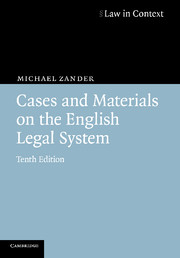Book contents
- Frontmatter
- Contents
- Preface to the tenth edition
- Preface to the First edition
- Acknowledgements
- Command papers, Hansard, House of Commons papers and other official publications excerpted
- Books, pamphlets, memoranda, speeches and articles excerpted
- Table of statutes
- Tables of cases
- CHAPTER 1 The organisation of trial courts
- CHAPTER 2 Pre-trial civil proceedings
- CHAPTER 3 Pre-trial criminal proceedings
- CHAPTER 4 The trial process
- CHAPTER 5 The jury
- CHAPTER 6 Costs and the funding of legal proceedings
- CHAPTER 7 Appeals
- CHAPTER 8 The legal profession
- Index
CHAPTER 7 - Appeals
Published online by Cambridge University Press: 05 June 2012
- Frontmatter
- Contents
- Preface to the tenth edition
- Preface to the First edition
- Acknowledgements
- Command papers, Hansard, House of Commons papers and other official publications excerpted
- Books, pamphlets, memoranda, speeches and articles excerpted
- Table of statutes
- Tables of cases
- CHAPTER 1 The organisation of trial courts
- CHAPTER 2 Pre-trial civil proceedings
- CHAPTER 3 Pre-trial criminal proceedings
- CHAPTER 4 The trial process
- CHAPTER 5 The jury
- CHAPTER 6 Costs and the funding of legal proceedings
- CHAPTER 7 Appeals
- CHAPTER 8 The legal profession
- Index
Summary
An appeal system is necessary to perform a variety of functions. One is to provide an opportunity for the disappointed litigant to test the validity of the decision at first instance. A second is to allow the court ‘to correct an error, unfairness or wrong exercise of discretion which has led to an unjust result’. A third purpose of the appeal system is to preserve some measure of uniformity in the decisionmaking of lower courts. The doctrine of precedent is an important aide in this process. Lower courts are encouraged and in some circumstances are required to follow the indications of the higher courts on matters of law and practice, the assessment of damages and even fact-finding. A fourth function of the appeal court is to keep the law abreast of changing circumstances. A fifth reason is to promote public confidence in the administration of justice.
In the earliest days of the system the appeal process was exceedingly limited. In civil cases, procedure was by writ of error and the basis of the appeal was that there was some error appearing on the face of the record. Since only certain things appeared on the record there were many issues on which no appeal was possible. Later the courts allowed each party to move a Bill of Exceptions, in which the trial judge was asked to note that a particular point had been rejected by the judge and this was then treated as part of the record for the purpose of an appeal.
- Type
- Chapter
- Information
- Cases and Materials on the English Legal System , pp. 654 - 734Publisher: Cambridge University PressPrint publication year: 2007



